What is a good conversion rate for a hotel website?
The conversion rate of a website is a key metric to consider when evaluating its performance. However, it’s challenging to improve your conversion rate without first understanding the many factors that influence it.
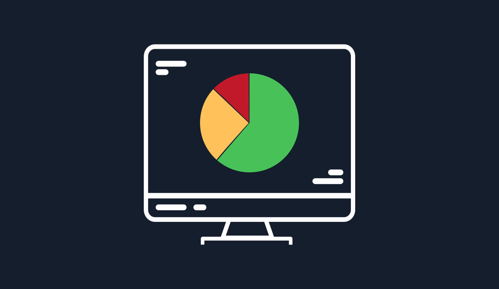
According to Google a ‘conversion’ is a completed activity that is important to the success of your business. What does that mean for hotels? A conversion could include a completed sign-up for your email newsletter (a goal conversion) or an accommodation booking (a transaction, sometimes called an Ecommerce conversion).
In the hotel industry, the generic term ‘conversion rate’ refers to the ratio between the total number of sessions to your hotel website and completed reservations, or in more simple terms, out of 100 visitors to a hotel’s website how many proceed to book. 1 out of 100 would equate to a 1% hotel conversion rate.
The conversion rate of a website is a key metric to consider when evaluating its performance. However, it’s challenging to improve your conversion rate without first understanding the many factors that influence it. Here we breakdown some of the most important factors, that we measure at Hotel Benchmark.
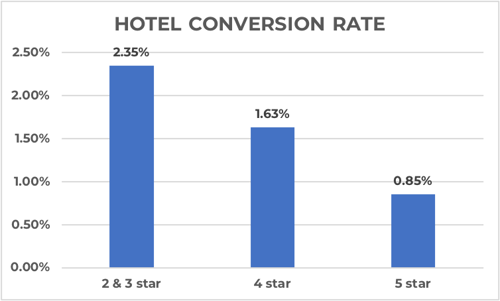
Making use of data from 550+ hotels subscribing to Hotel Benchmark, we observe a ‘typical’ average conversion rate for 2 and 3-star hotels of 2.35%. The overall correlation observed is that as star rating increases, conversion rate decreases. But why? 2 and 3-star properties generally have a lower price point, meaning a lower financial investment and risk proposition for a guest making a booking via the hotel’s website.
5-star guests on the other hand can be a little more exacting with their requirements, often preferring the security of a telephone reservation that will provide an opportunity to ask questions and ensure the hotel can meet all of their needs.
GROUP OR INDEPENDENT
Take a look at an article published recently by 80 DAYS, analysing data from an h2c industry report alongside data from Hotel Benchmark to compare the website and booking engine conversion rates of independent hotels versus groups. h2c’s study evaluated the responses and data from 76 small, medium and large hotel chains during 2019 to determine that the average website conversion rate for a hotel group was 1.9%. Using the most comparative independent hotel data from the 550 hotels within Hotel Benchmark, we know that the average website conversion rate in 2019 was 0.73%.
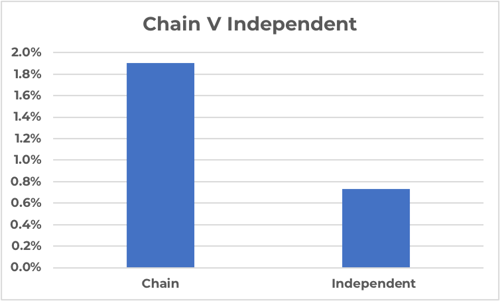
How are group or chain hotels able to achieve a higher conversion rate?
There is an inherent value in group or chain when it comes to reassuring visitors of a certain quality associated with the brand, especially when travelling to an unfamiliar location. Brands can help reassure travellers when looking and booking and familiarity with the on-line reservation process can also help drive conversion rate.
SIZE
Hotels with a larger number of rooms tend to have more traffic and lower conversion, because typically they do not exclusively sell accommodation. Many have multiple restaurants on site, conference and meeting facilities and possibly a spa. Ancillary services attract much more traffic and a higher number of sessions on a larger hotel’s website which is unlikely to convert purely into bedroom bookings.
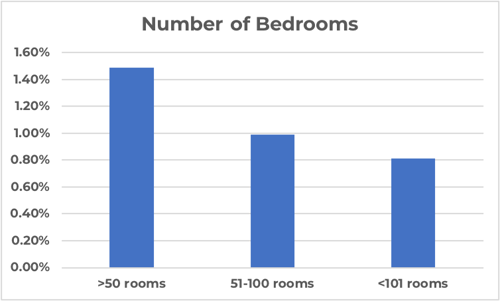
As number of bedrooms increases we observe that conversion rate decreases. When setting up your Google Analytics account, you can segment your traffic by excluding sessions for conference and events, spa and restaurant pages to calculate conversion rate based on the remaining traffic. Look out for a future article on how you can improve your Google Analytics set up to achieve improved reporting.
PROPERTY TYPE
City properties convert at more than twice the rate (0.67%) of resort based properties. Country hotels sit somewhere in between at 0.82%.
We think this comes down to the persona of the traveller and the difference in purchasing priorities between a leisure and business traveller.
A city hotel is likely to have a higher percentile of corporate travellers who are perhaps less exacting with their requirements – location, Wi-Fi and a good night sleep will be priorities. Conversely, a resort hotel is likely to have a higher percentage of leisure travellers, those booking their main holiday of the year – an eagerly anticipated and carefully considered purchase requiring multiple repeat visits and discussion before booking.
TECHNOLOGY
Unsurprisingly, we see that desktop converts best, regardless of star rating.
2.52% of 4-star traffic converts on desktop compared to 1.34% of 5-star desktop traffic. Tablet ranks 2nd, with 1.69% for the 4-star category and 0.91% for 5-star. Finally, mobile/smartphone performance continues to remain in 3rd place – converting at 0.90% for the 4-star market and 0.48% for 5-star. The picture is similar for 2 and 3-star hotels with desktop conversion outpacing mobile by 150%.
While desktop converts best, often mobile devices are used to research a booking, before the final booking takes place on a desktop or tablet device - sessions are typically double on mobile devices. We observe that the trend towards booking hotels on mobile or smartphones is climbing. Conversion rate on mobile is growing across all star categories.
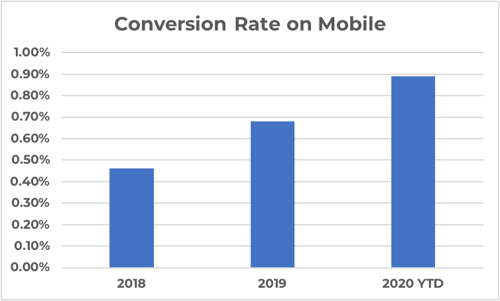
There has been a 47% increase in mobile conversion between 2018 and 2019 and 31% increase between 2019 and 2020. Any hoteliers who haven’t yet adopted a ‘mobile first’ strategy and developed a responsive website will be at a distinct disadvantage.
There are of course multiple other factors that can impact your conversion rate in addition to those we measure on the Hotel Benchmark; guest age, gender & nationality, reviews and ratings, and rate parity and sometimes we can focus on conversion rate and miss the bigger picture which should consider number of sessions and revenue. We will be looking at those in future articles.
If you’re a hotelier, we’d be delighted to provide you with a free benchmark report each month, in return for you sharing your data – anonymously and securely. Sign up here.
Categories:
A digital marketing expert and Marketing Manager at 80 DAYS, Sam is also the creator and editor of Hotel Speak (http://www.hotelspeak.com) and lectures in digital marketing at Heriot-Watt University in Edinburgh.


